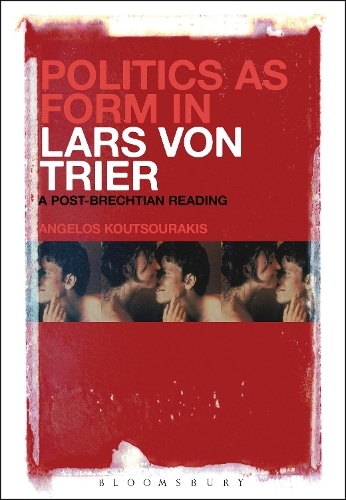
Politics as Form in Lars von Trier: A Post-Brechtian Reading
(Hardback)
Available Formats
Publishing Details
Politics as Form in Lars von Trier: A Post-Brechtian Reading
By (Author) Dr Angelos Koutsourakis
Bloomsbury Publishing PLC
Bloomsbury Academic USA
19th December 2013
United States
Classifications
General
Non Fiction
791.430233092
Physical Properties
Hardback
264
Width 152mm, Height 229mm
526g
Description
This is the first study that employs a materialist framework to discuss the political implications of form in the films of Lars von Trier. Focusing mainly on early films, Politics as Form in Lars von Trier identifies recurring formal elements in von Triers oeuvre and discusses the formal complexity of his films under the rubric of the post-Brechtian. Through an in depth formal analysis, the book shows that Brecht is more important to von Triers work than most critics acknowledge and deems von Trier a dialectical filmmaker. This study draws on many untranslated resources and features interviews with Lars von Trier and his mentor, the great Danish director Jrgen Leth.
Reviews
From Brechtian to Post-Brechtian: Koutsourakis moves beyond the mere allegorical readings of the films' content and challenges the simplistic dichotomies that traditionally [restricted] von Trier's Brechtianism [...] Unlike other books on von Trier . . . this richly illustrated study pushes the analysis to reveal von Trier's multiple connections with the avante-garde and Italian Neo-Realism, also including interviews with the director and his mentor Jorgen Leth. -- Sara Morino, University of Westminster, UK * CINEJ Cinema Journal *
Angelos Koutsourakiss stimulating and thought-provoking monograph on Lars von Trier presents the Danish director as a political filmmaker in the Brechtian tradition. In addition to offering a sophisticated and stimulating analysis of the political aspects of Lars von Triers films, the monograph also has a number of other qualities that make it an essential read for anyone interested in Lars von Trier. It revalorises von Triers early films and discusses a number of his lesser-known projects (such as the unfinished, and now aborted, Dimension project); it introduces material to which only Danish readers have previously had access, and it includes Koutsourakiss own interviews with Lars von Trier and Jrgen Leth. Finally, like Bainbridge, Koutsourakis presents a number of von Triers manifestos from 1984 to 2001, giving the reader a lot of material to engage with dialectically or not. -- Nikolaj Lubecker * New Review of Film and Television Studies *
[Full of] fresh individual insights ... Koutsourakis has produced a well-researched and innovative study, which will be of use to everyone interested in von Trier's cinema and its relation to Brecht. * Brecht Yearbook *
Koutsourakiss study succeeds in two ways. It identifies the political dimension of Brechts artistic practice not in his Marxist ideology or modernist devices but in his aesthetics of negation. Second, it positions von Trier in this tradition as a post-Brechtian filmmaker whose experimental and irritating productions like Brechts politicize the audiences perception of history and the present through their formal properties of radical negation. Unlike many books on von Trier, this richly illustrated study, including interviews and relevant documents, pushes far beyond the biographical into the media and representational aesthetics that distinguish this body of challenging films. -- Marc Silberman, Professor, Department of German, and Director, Director, Center for German and European Studies, University of Wisconsin-Madison, US
In his book, Angelos Kousourakis takes a new and innovative look at the cinema of Lars von Trier. Using Bertolt Brechts theories as a key, he analyses the political and ideological aspects of Lars von Triers oeuvre with sharp intellectual energy. In Koutsourakiss reading, Triers radicalism is made visible: Lars von Trier as a revolutionary! -- Peter Schepelern, Associate Professor, Department of Media, Cognition and Communication, University of Copenhagen, Denmark
Author Bio
Angelos Koutsourakis is Associate Professor in Film and Cultural Studies at the Centre for World Cinemas and Digital Cultures, University of Leeds, UK. He is the author of Rethinking Brechtian Film Theory and Cinema (2018) and the co-editor of Cinema of Crisis: Film and Contemporary Europe (2020) and of The Cinema of Theo Angelopoulos (2015).
